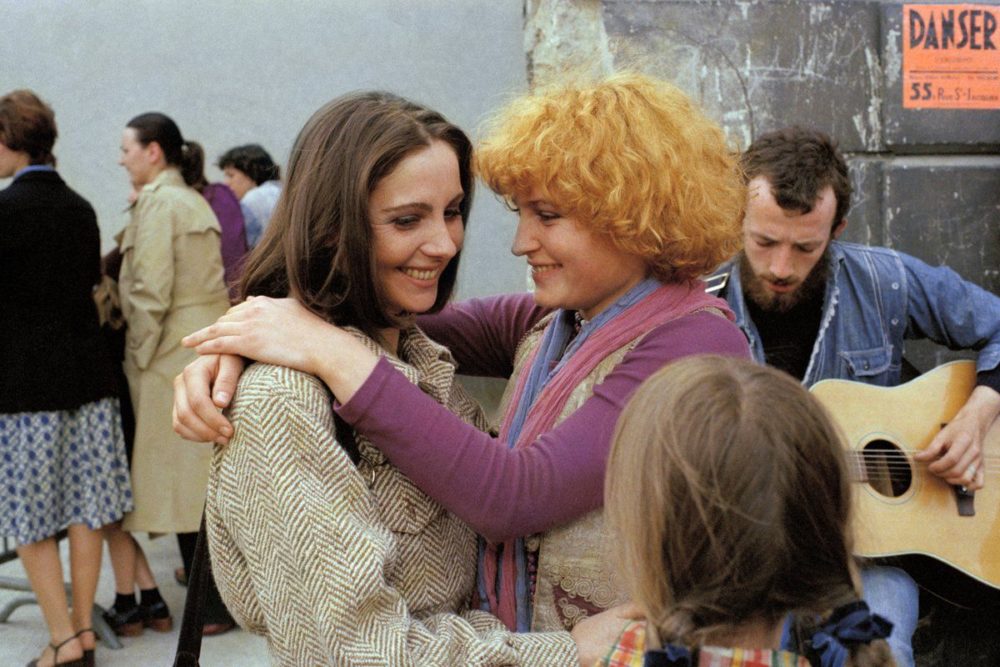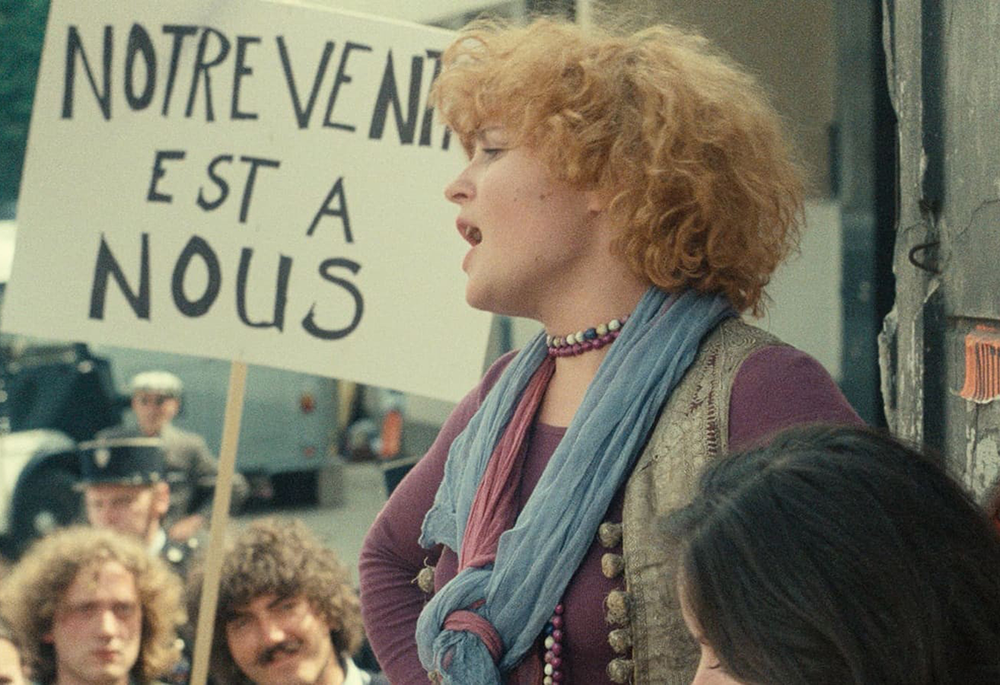Em novembro de 2023 a versão em
inglês do Dossiê Agnès Varda foi publicada. Em janeiro de 2024, depois de uma
treta com a Amazon, a versão em português do mesmo e-book foi disponibilizada.
Nós do Cine Suffragette organizamos o material mandado para nós por 11 mulheres
da crítica. Uma delas foi a Marianne do blog Make Mine Film Noir. Ela, mais
tarde, me indicou para um desafio: escrever sobre meu filme favorito da Varda.
Isso é realmente desafiador, pois considero meu filme favorito da Varda sempre
o último dela que vi – porque todos são muito bons! Dito isto, meu atual filme
favorito da Varda é “Uma Canta, a Outra Não” (1977). Aqui está a crítica
bilíngue do filme, que você encontrará, junto a outros ótimos textos, no e-book
que pode ser comprado AQUI.
In November of 2023 the
English version of The Agnès Varda Files was published. In January of 2024,
after a kerfuffle with Amazon, the Portuguese language version of the same
e-book was made available. We at Cine Suffragette organized the material sent
to us from 11 female writers. One of them was Marianne from the blog Make Mine Film Noir. She later tagged me in a challenge: to write about my favorite Varda
film. This is truly challenging, as I consider my favorite Varda film always
the last one I watched – they all are so very good! That being said, my current
favorite Varda film is “One Sings, the Other Doesn’t” (1977). Here’s the
bilingual review of the film, something that you will find, alongside other great
texts, in the e-book that can be bought HERE.
Diretora, atriz, roteirista,
produtora e letrista: estes são os muitos papéis que Agnès Varda teve no
cinema. Letrista pode vir como uma surpresa, mas desde “Lola” (1961) de Jacques
Demy, Varda escreveu as letras de músicas de filmes dela própria e de outras
pessoas. Ela escreveu as letras – “paroles” como diz o crédito – das canções em
seu mais icônico filme musical, “Uma Canta, a Outra Não” (1977), uma ode à
sororidade e à amizade entre mulheres.
Director, actress,
screenwriter, producer and lyricist: these are the many roles Agnès Varda had
in filmmaking. Lyricist may come as a surprise, but since Jacques Demy’s “Lola”
(1961), Varda wrote lyrics for music in her films and films of others. She
wrote the lyrics- “paroles” as the credits say - for the songs in her most
iconic musical film, “One Sings, the Other Doesn’t” (1977), an ode to sorority
and female friendship.
Pauline (Valérie Mairesse) é
uma garota moderna. Quando seu pai diz que, para garotas sem estudo, o que
resta é “o casamento ou a prostituição”, ela retruca: dá na mesma. Pauline
volta a ter contato com uma antiga vizinha, Suzanne (Thérèse Liotard), que está
grávida de seu terceiro filho com seu amante, o fotógrafo Jérôme (Robert
Dadiès). Incapaz de ter outro filho, Suzanne faz um aborto, seguindo o conselho
de Pauline e pegando dinheiro emprestado com ela para ir até a Suíça – afinal,
é 1962 e o aborto só seria legalizado na França em 1975.
Pauline (Valérie
Mairesse) is a modern girl. When her father tells her that, for girls who don’t
have a degree, what is left is “marriage or prostitution”, she answers: “that’s
the same”. Pauline regains acquaintance with an old neighbor, Suzanne (Thérèse
Liotard), who is pregnant with her third child with her lover, the photographer
Jérôme (Robert Dadiès). Unable to have another kid, Suzanne has an abortion,
following Pauline’s advice and borrowing money from her to go to Switzerland -
after all, it’s 1962 and abortion would only be legalized in France in 1975.
E é em 1972, durante o julgamento que iniciou a mudança, que Pauline e Suzanne se reencontram, dez anos após a tragédia do suicídio de Jérôme que as afastou, com Suzanne tendo ido morar novamente com os pais. Pauline, agora chamada de Pomme pelos amigos, também fez um aborto antes da legalização: ela teve de ir até Amsterdã e lá conheceu seu atual namorado, o iraniano Darius (Ali Rafie). Dali em diante, as duas trocam cartões-postais falando sobre si mesmas, e Varda como narradora nos informa que elas pensam uma na outra constantemente, em uma “inexplicável amizade entre duas mulheres muito diferentes”.
And it is in 1972,
during the judgment that started the change, that Pauline and Suzanne meet
again, ten years after the tragedy of Jérôme’s suicide drew them apart, with
Suzanne having to go back to her parents’ house. Pauline, now called Pomme by
her friends, also had an abortion before the legalization: she had to go to
Amsterdam and there she met her current boyfriend, the Iranian Darius (Ali
Rafie). From them on, the two exchange postcards talking about themselves, and
Varda as the narrator lets us know that they think of each other constantly, in
an “inexplicable friendship between two very different women”.
É entre mulheres que ambas, Pomme e Suzanne,
encontram consolo e alívio. Pomme se sentiu aliviada, ao se submeter ao aborto,
ao ver tantas mulheres diferentes na mesma situação, literalmente no mesmo
barco que as levava para a clínica. Suzanne se sentiu aceita numa família pela
primeira vez quando ela conheceu as outras mulheres que trabalhavam na fábrica,
onde ela conquistou independência financeira. Agora Suzanne trabalha em uma
clínica de planejamento familiar onde, entre outras coisas, briga com católicas
que não querem tomar a pílula que lhes foi prescrita.
It is among women that
both Pomme and Suzanne find solace. Pomme felt relieved to go through an
abortion seeing so many different women at the same situation, sharing a both
ride to and from the clinic. Suzanne felt accepted in a family for the first
time when she met the other women who worked in the factory, where she found
financial independence. Now Suzanne works in a family planning clinic where,
among other things, argues with Catholics who don’t want to take the prescribed
pill.
O filme toma ares exóticos quando Pomme e Darius
vão para o Irã. O filme estreou um ano antes da Revolução Iraniana, que tentou
– e em alguns casos falhou, graças à resistência das mulheres – remover
direitos das mulheres e afastá-las da força de trabalho. No filme, Pomme
menciona que sente que há uma separação no Irã entre o mundo feminino, nos
banhos turcos e mercados, e o mundo masculino, nas ruas e cafés. É também no
Irã que Pomme percebe Darius se transformando, de um cara liberal e feminista,
em um marido tradicional. Pomme, que só queria romance num local exótico,
começa a se sentir presa.
The film takes an
exotic turn when Pomme and Darius go to Iran. The film was released one year
before the Iranian Revolution, that tried - and in some extent failed, thanks
to women’s resistance - to remove women’s rights and send them away from the
workforce. In the movie, Pomme mentions feeling that there is a separation in
Iran between the female world, in Turkish baths and markets, and the male
world, in the streets and cafés. It’s also in Iran that Pomme notices Darius
morphing from a liberal, feminist dude into a traditional husband. Pomme, who
only wanted romance in an exotic location, is feeling trapped instead.
Agnès Varda assinou o “Manifesto das 343”, um
abaixo-assinado assinado por 343 mulheres francesas, algumas delas notórias,
que fizeram aborto. Ele foi assinado em 1971 e inspirou outro abaixo-assinado,
este de 331 médicos que pediam pela legalização do aborto. É por isso que Varda
trata aborto e gravidez como iguais, como escolhas – como sempre deveria ser.
Agnès Varda signed the “Manifeste
des 343”, a manifest signed by 343 notorious French women who had had
abortions. It was signed in 1971 and inspired a follow-up petition signed by
331 doctors asking for the legalization of abortion. That’s why Varda treats
abortion and pregnancy as equals, as choices - as it should always be.
É dito no filme que todas as canções são de autoria de Pomme. Estas músicas são sobre sororidade, sentimentos durante a gravidez, a jornada dupla que as mulheres enfrentam, o fato de que “meu corpo é meu” e muitos outros assuntos feministas. As músicas não são chiclete, mas são ao mesmo tempo inspiradas e inspiradoras. No IMDb, Varda não é creditada pelas letras das músicas, mas mesmo sem este crédito no filme podemos perceber que as letras são dela, pois Varda era uma “feminista raivosa”, como ela mesma se definia: uma vez disse que queria ser uma feminista alegre, mas estava com muita raiva de como as coisas estavam. Então ela lutou para mudar as coisas, com a arma que dominava: o cinema.
It’s said in the film
that all songs are by Pomme. These songs are about sorority, feelings during
pregnancy, the double journey women face, the fact that “my body is mine” and
many other feminist issues. The songs are not catchy, but are both inspired and
inspiring. On IMDb, Varda is not credited for the lyrics of the songs, but even
without the credits in the film we can see they are hers, as Varda was the
staunch angry feminist she called herself, as she once said that she wanted to
be a joyful feminist, but was too angry with the way things were. So she fought
to change things, with the weapon she dominated: cinema.
A filha de Suzanne, Marie, repete um discurso
feminista para um namorado, que a zomba. Na verdade, o filme termina com a
câmera em Marie, com a narradora dizendo que as coisas provavelmente seriam
mais fáceis e mais claras para Marie e as garotas da geração dela, porque
mulheres como Suzanne e Pomme lutaram por elas. Não é uma escolha sem
significado: Marie aqui, aos 17 anos, é interpretada pela filha de Varda,
Rosalie, para quem o filme é dedicado. Com “Uma Canta, a Outra Não”, Varda
estava criando um futuro para Rosalie, e nos contando com todos os detalhes que
tipo de futuro era este. Porque é isso que nós mulheres fazemos juntas: criamos
futuros.
Suzanne’s daughter
Marie repeats a feminist speech for a boyfriend, who mocks her. Actually, the
film ends with the camera on Marie, with the narrator saying that things would
probably be easier and clearer for Marie and the girls form her generation,
because women like Suzanne and Pomme fought for them. It’s not a meaningless
choice: Marie here, at age 17, is played by Varda’s daughter Rosalie, to whom
the movie is dedicated. With “One Sings, the Other Doesn’t”, Varda was creating
a future for Rosalie, and telling us with all details which kind of future it
was. Because it’s this that us women do together: we create futures.






2 comments:
I have to see "One Sings, the Other Doesn't." In fact, I found it in my library system, and I hope it arrives soon.
Your review is filled with some great details that I did not know about Agnès Varda. And I didn't even read closely because I didn't want to read all the spoilers!
I plan (eventually) to see all of her films. She certainly was prolific.
Thanks so much for accepting the Movie Blogger Challenge. And thanks for "The Agnès Varda Files"!
This sounds interesting, Le! I've only seen one Agnes Varda film (Cleo from 5 to 7), but I've heard so much about her that I'd like to see more. I hope I can start with this one. Good stuff.
-- Karen
Post a Comment